Daunting as it might feel for some, everyone should travel solo at least once. Do you need encouragement? If so, consider these advantages and benefits of solo travel. It can be one of life’s rewarding, life-changing experiences, with opportunities for self-discovery and growth. If you’ve never tried it, consider taking the plunge.
Table of Contents
What is solo travel?
Collins is my go-to resource for helping unravel the intricacies of the English language. According to Collins, ‘solo’ is “… to indicate that someone does something alone rather than with other people.”
The very nature of solo travel is that a solo traveller isn’t always alone. Chances are a solo traveller will take a free walking tour, sign up for a food tour, take a bus tour for the day, or share another type of travel experience with others. These opportunities will lead to sharing a meal with someone, striking up conversations with others, being approached by a local wanting to practise language skills, sharing a tuk-tuk or ride share to cut costs, or travelling with another person for a short period.
Some consider joining a guided tour as an individual falls under the umbrella of solo travel. It may be the first step for people who don’t want to travel alone. Some might add time at the beginning or end of the tour to explore a place in more depth by themselves.
Choose which of these travel styles works for you and call it solo travel if you wish.
Choose solo travel before it chooses you
“What prompted your first foray into solo travel?” Pose that question to several solo travellers, and some common themes emerge.
During difficult or stressful times, travel can help feed the spirit. Some choose to travel to escape a toxic environment or deal with a life-altering event, such as losing a job, relationship, or loved one. Others see travelling to a different environment as the first step to healing a broken heart. Many are tired of missing out while waiting for others to decide, accumulate the funds, warm to a particular destination, or have vacation times align. Or perhaps someone has had a poor experience travelling with a group or with disagreeable people and has no interest in the possibility of repeat performances.
These are common scenarios. Before one of them chooses you when you’re least prepared, how about taking a proactive approach? You might discover you prefer solo travel and need to explain to friends or former travelling companions why you’d rather travel without them.
My solo-travel journey
I had several solo travel experiences in my youth, but many merged into trips shared with others along the way.
It was much later that a trip planned with a friend to the United Arab Emirates, Jordan, and Türkiye took an unexpected turn. Unfortunately, a medical emergency resulted in her cancelling just five hours before our departure. During the flight to Dubai, I desperately missed my friend and wondered what new insights this sudden turn of events would reveal.
It was an eye-opener. After abandoning the plan to hire a driver for the ride to Petra, several Jordanians helped me find public transportation. While waiting in a South Amman car-and-bus park for the van to fill with passengers, I chatted with the driver and a backpacking Australian. After cancelling the Airbnb booked in Istanbul, I checked into a hostel. This led to spending a few days sightseeing with two women, one from Germany and the other from the United States. At the airport in Amman, I chatted with a Jordanian doctor waiting for his flight to Mecca for the Hajj pilgrimage and a young Palestinian keen to practise his English.
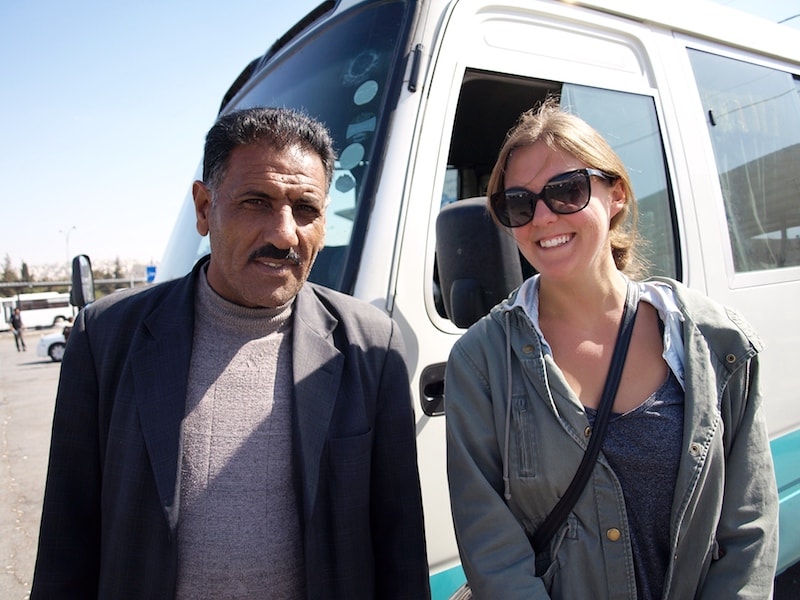 Amman, Jordan
Amman, Jordan
It reminded me that travelling solo doesn’t mean being alone. It led to conversations with people I wouldn’t have had otherwise, and brief travel experiences with different travelling companions. It rekindled my interest in solo travel.
Jacqueline Boone: “Traveling solo does not always mean you’re alone. Most often, you meet marvelous people along the way and make connections that last a lifetime.”
It’s not as scary as one might think. These, and subsequent solo travel experiences, have convinced me it’s always an option and sometimes preferable to travelling with others.
Do you have the skills to travel solo?
Think of situations when you’ve ventured into unknown territory and filled out forms, booked an appointment, purchased insurance, organized an event, hired someone to repair something, made a significant purchase, resolved everyday problems, or figured out how to avoid toxic people. Those skills are transferrable to solo travel.
It means you can apply for a visa, book a day tour, hire a driver, choose a compatible short-term travelling companion, and wallow in the benefits of solo travel. When things don’t go as planned (and they will), you’ll be able to roll with them and get on with your day.
Advantages and benefits of solo travel
With so many advantages and benefits, it’s no wonder solo travellers are a growing demographic, especially among older women.
I’m choosing not to focus on the disadvantages. Yes, there may be occasional feelings of loneliness. You may miss not having someone to split the cost of a hotel room or holiday apartment, have your back, or share the highlights and missteps of the day. However, the advantages and benefits of solo travel far outweigh the drawbacks. Here are ten that come to mind.
1. More travel opportunities
You don’t need to rely on potential travelling companions to have the time (or timing), money, interests, or emotional resources to make themselves available. Also, it’s usually easier to find a coveted award flight on points for one person, a single ticket to an almost sold-out performance, a small table or bar stool in a crowded restaurant, or limited space on a tour.
2. Enhanced spontaneity
You can book travel on impulse or when a deal surfaces. Going solo allows for decision-making on a whim or changing your mind, as mood and energy levels dictate. Jump on a bus and make a split decision to get off if you see something interesting. Stay longer at a destination or leave earlier than planned.
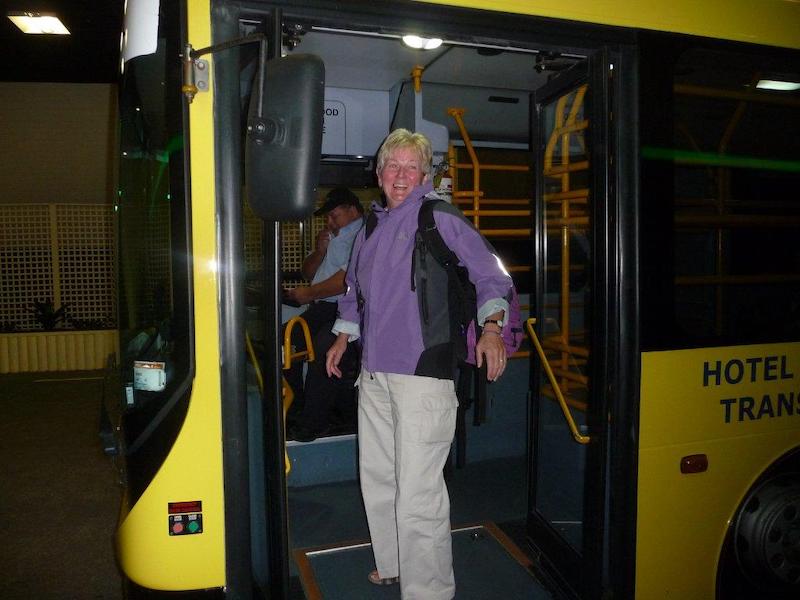 Auckland, New Zealand
Auckland, New Zealand
3. Develop confidence and skills
Solo travel presents an opportunity to expose the more courageous parts of yourself and work on those that hold you back.
Pushing personal boundaries, interacting with strangers, developing self-sufficiency, facing fears head-on, trusting your instincts, handling emergencies, solving problems, and being assertive … all help build confidence and problem-solving skills. Both are portable and transfer well to other facets of life.
4. More opportunities for reflection
Travelling alone presents opportunities to go slower, observe more, revel in the surprise of the unexpected, absorb the unfamiliar, and draw conclusions about what’s being seen and felt.
It can be an advantage to experience a place without the filter of another person. In The Art of Travel, celebrated author Alain de Botton suggests that our responses to the world are influenced by the company we keep, with the possibility of aligning our curiosity and reactions with the expectations and opinions of others.
Energy isn’t invested in social interaction, communication, compromise, or constantly being considerate and polite. With less focus on a travelling companion, you concentrate more on your surroundings and the people around you. Your senses are heightened. You’re listening to a place and feeling its pulse. It allows you to be awed by the wonder of your surroundings and be more open and connected to the world and what it reveals. You can focus on the travel experience and what can be learned. You’re likely to do more, and you have time to think. In a world of multiple distractions, this is a luxury.
Thomas Jefferson: “I think one travels more usefully when they travel alone, because they reflect more.”
It also means taking advantage of places conducive to contemplative reflection and introspection and being comfortable alone. I love stumbling on a spot that beckons me to sit, reflect, and listen to my inner voice. It usually involves a healthy dose of gratitude for the privilege of travel while savouring a stunning view or basking in the pleasure of mindfully enjoying a meal.
Bob Marley: “Some people feel the rain. Others just get wet.”
 Istanbul, Türkiye
Istanbul, Türkiye
5. Promotes independence and flexibility
You’re responsible for your schedule to do what, when, and where you want. You’re nobody else’s tour guide or caretaker. There’s no need to express your needs, consider the needs of others, consult, convince, justify, or compromise. Sleep patterns are yours to manage; stay up late or get up at dawn. Take a mid-afternoon nap or turn in early. You eat or drink whatever, whenever, or wherever. Eat on the fly, grab a coffee on the run, or splurge on a culinary adventure lasting several hours.
You’re at liberty to choose your style and pace of travel. Breeze through three countries in a week or spend three weeks in one place. Explore what interests you, superficially or as deeply as you wish. You’re free to avoid those things that hold little or no interest or dive deeply into those that do. It allows you to be completely selfish with your time.
It encourages packing light because there’s no one to carry your bags or watch your stuff. Travelling solo and packing light go hand in hand, so many solo travellers have a carry-on-only policy.
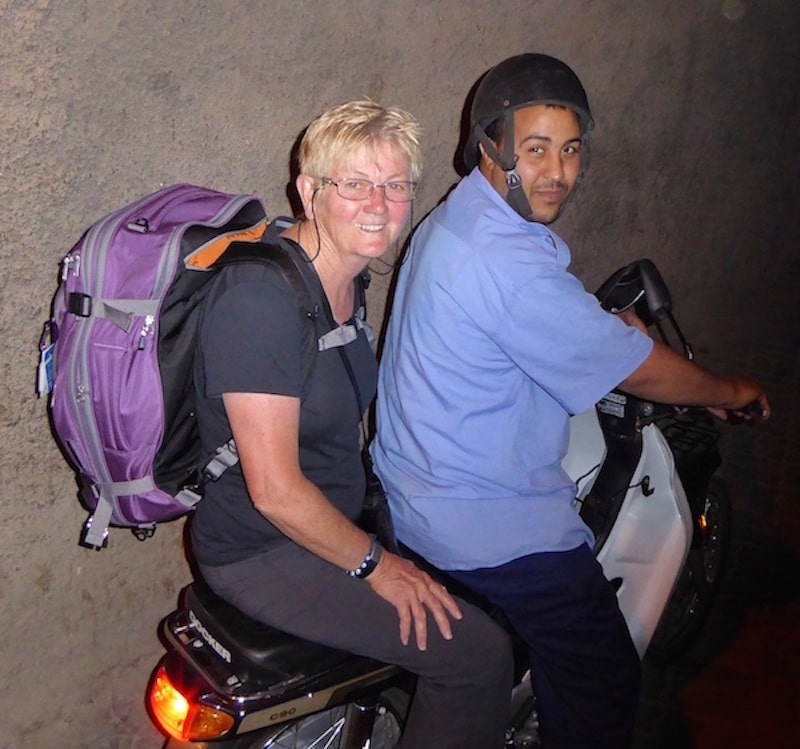 Marrakech, Morocco
Marrakech, Morocco
Travelling solo is about freedom. There’s no one to slow you down or hold you back. It can be a relaxing and less stressful way to travel. It’s also a luxury and a privilege; discovering its essence can be liberating and empowering.
6. Meet interesting people
Being alone encourages us to be more outgoing and engage others in conversation if we crave company. It makes us more approachable. We’re more likely to have conversations with strangers, which can help us become better listeners. It’s an opportunity to meet and learn from people of different ages, countries, and cultures.
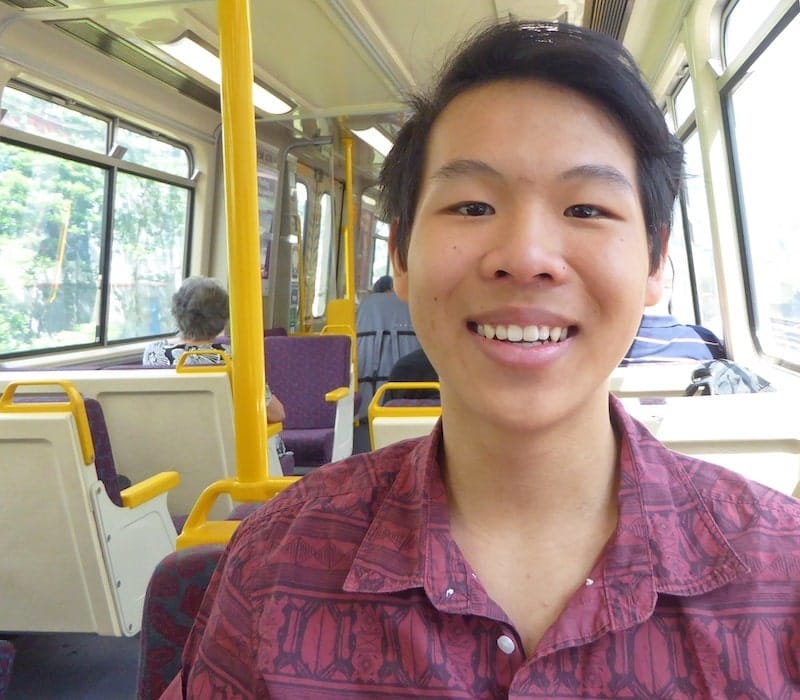 Brisbane, Australia
Brisbane, Australia
Meeting new friends and short-term travelling companions leads to spending time with others. It can be fast-tracked by staying in hostels, signing up for free walking tours, or taking day tours, food tours, or cooking classes.
7. Knowing yourself better
Being away from home physically removes you from a supportive (or not-so-supportive) environment and pressure to conform to prevailing social norms and the expectations of others. It also offers respite from caring for others and the opportunity to appreciate the gift of having you all to yourself. Having no one to talk to or care for creates space for getting to know yourself better and appreciating yourself more.
Barbara De Angelis: “Women need real moments of solitude and self-reflection to balance out how much of ourselves we give away.”
You’ll develop the mental muscles and emotional fortitude to experience and learn from the joys of travel. It leads to defining or redefining what you like, what brings you joy, and what warms the soul. It often means:
-
- rearranging priorities
- exploring the unfamiliar
- taking risks
- meeting new challenges
- uncovering new possibilities and capabilities
- delineating boundaries
- being content in your own skin
- being comfortable eating alone
- enjoying silence
8. More enjoyable
Finding a compatible travelling companion can be a challenge. We each have our interests, desirable destinations, budgets, spending priorities, preferred pace of travel, sleep patterns, comfort levels, quirks, irritants, insecurities, reactions to the unfamiliar, and risk thresholds.
There’s no need to process someone else’s drama or allow it to undermine the travel experience. Travelling with the ‘wrong’ person can be stressful and emotionally draining, test a relationship, and ruin a trip.
9. Save time and money
It’s discouraging to invest in research and consultation only to have potential travelling companions change their minds about some aspect of the trip or decide not to go.
I’ve travelled with people who must stay in four-star hotels and eat in expensive restaurants. Another needs to travel by taxi because of too much luggage. Others are reluctant to travel to cheaper destinations off the well-trodden tourist trail. Travelling solo means choosing when and where you go and establishing your spending priorities. It permits jumping on deals when they surface and not waiting for others to decide when they’re ready.
10. Easier to leave home
When sharing a household with another person, there are fewer pre-trip tasks when the other person stays home.
Plus, travelling alone can enrich a relationship with a life partner or significant other. Emily makes a compelling case in Traveling Alone While Married: Why Solo Travel is Important.
Conclusion
If you love travelling solo, you’ll identify with these advantages and benefits. If you’re yet to take the plunge, hopefully some of them resonate with you.
Please stay tuned for Part 2: Solo Travel Tips.
If you found this post helpful, please share it by selecting one or more social media buttons. Also would you like to join the conversation? If so, what are some other advantages and benefits of solo travel? What do you enjoy most about travelling solo? Please add your thoughts in the comments. Thank you.
Might you be interested in these related posts?
Care to pin it for later?


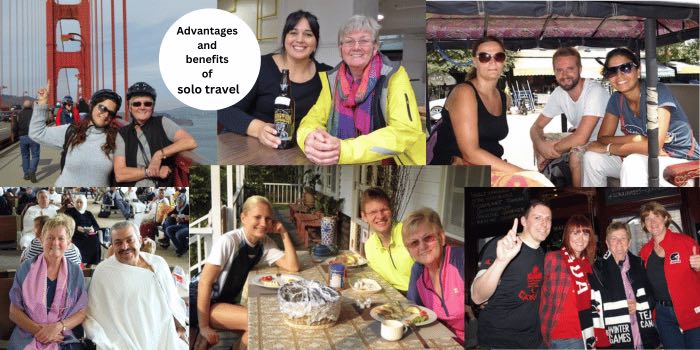




Great list! Having time for self-reflection and meeting new people are such a benefit of solo travel.
Sonia recently posted…Top 12 Things to Do in Golden Colorado
Hi. Great read. Time alone is always good…and time alone traveling is always the best!
I travelled solo for many years and enjoyed the freedom to go where and when I wanted. I certainly developed the skills I needed to plan and execute my trip on my own. I never found meeting people an issue. But I did find some things much more expensive when I had to pay for “single supplement” fees.
I haven’t travelled solo very much but it is definitely a great experience. I love our tips!
I love to travel solo sometimes, and with my husband, other times! There are benefits to traveling no matter how you do it! This was a great read, and inspired me to plan my next trip. Thanks for sharing!